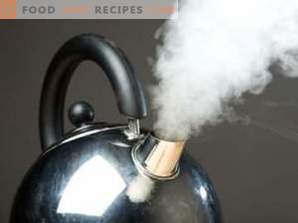
All our readers know for sure that you can boil water only once. However, the reasons for this recommendation can only answer a few. Today we will talk about what happens to the precious liquid during boiling, and what threatens re-boiling.
Despite the fact that the composition of the water molecule is known to everyone - two hydrogen atoms and one oxygen atom, this colorless liquid also contains a mass of impurities, most of which are not only not useful, but also can harm our body. What happens during boiling? All bacteria and microbes contained in water die (in fact, we boil water for this), but at the same time water molecules and oxygen evaporate at 100 degrees Celsius, while the impurities remain in the water, and their concentration increases sharply . Hydrogen atoms do not perish when the temperature rises, but settle to the bottom and thereby make the liquid heavier. Chlorine, which is necessarily contained in the water pouring from the taps in our apartments, when heated, reacts with organic substances, as a result of which dangerous carcinogens are formed, which, as we know, provoke the development of cancerous tumors, and dioxins. And finally - with each boiling water becomes more and more saturated with salts and metals, while losing its taste. Water is necessary for man, because almost 80% of it consists of this colorless, odorless, but such a priceless liquid. To each sip was really useful, you must follow a few simple recommendations.
First of all, use fresh water for boiling. If a small amount of water remains in the kettle, you should not add water to it, you need to pour out the leftovers and pour fresh.
It is advisable to boil at least a couple of hours of water, rather than tap water. This will allow heavy impurities contained in the water to settle on the bottom and not to get into your glass, and, consequently, in the body.
If you decide to fill a thermos with boiling water, then do not clog the lid immediately, but wait a couple of minutes.
Of course, it's up to you to boil water several times or use fresh water each time to boil. However, we should not forget that the accumulation in the body of harmful compounds formed in water during boiling, slowly, but still occurs. What it may lead in the future, we can only guess.























